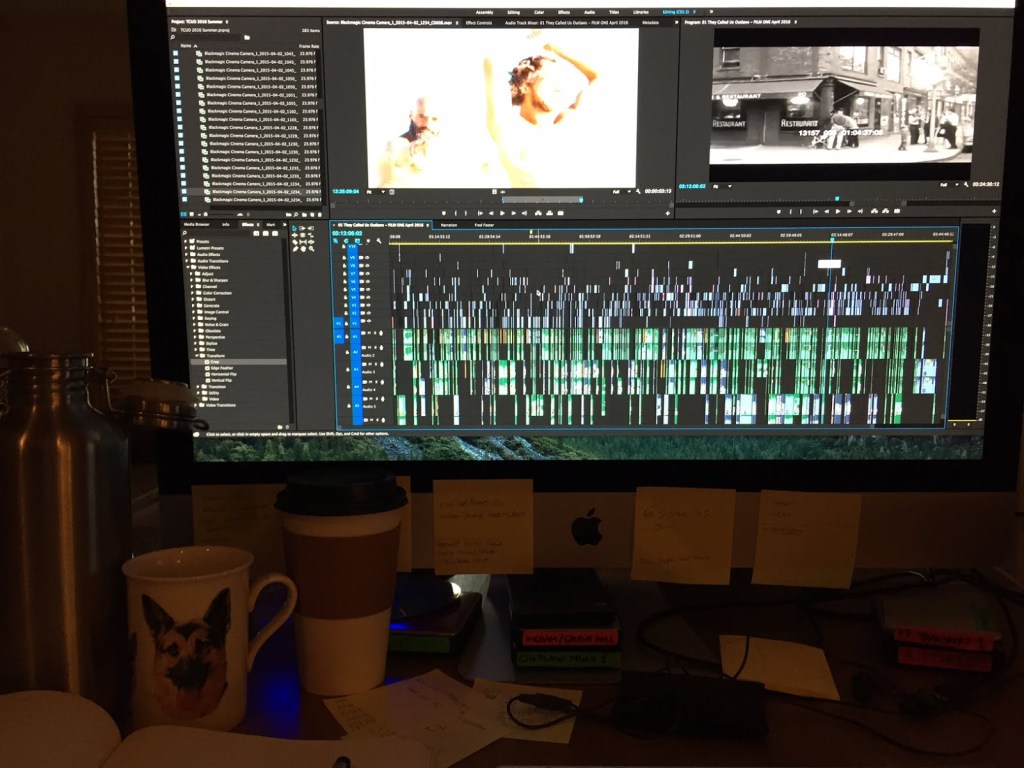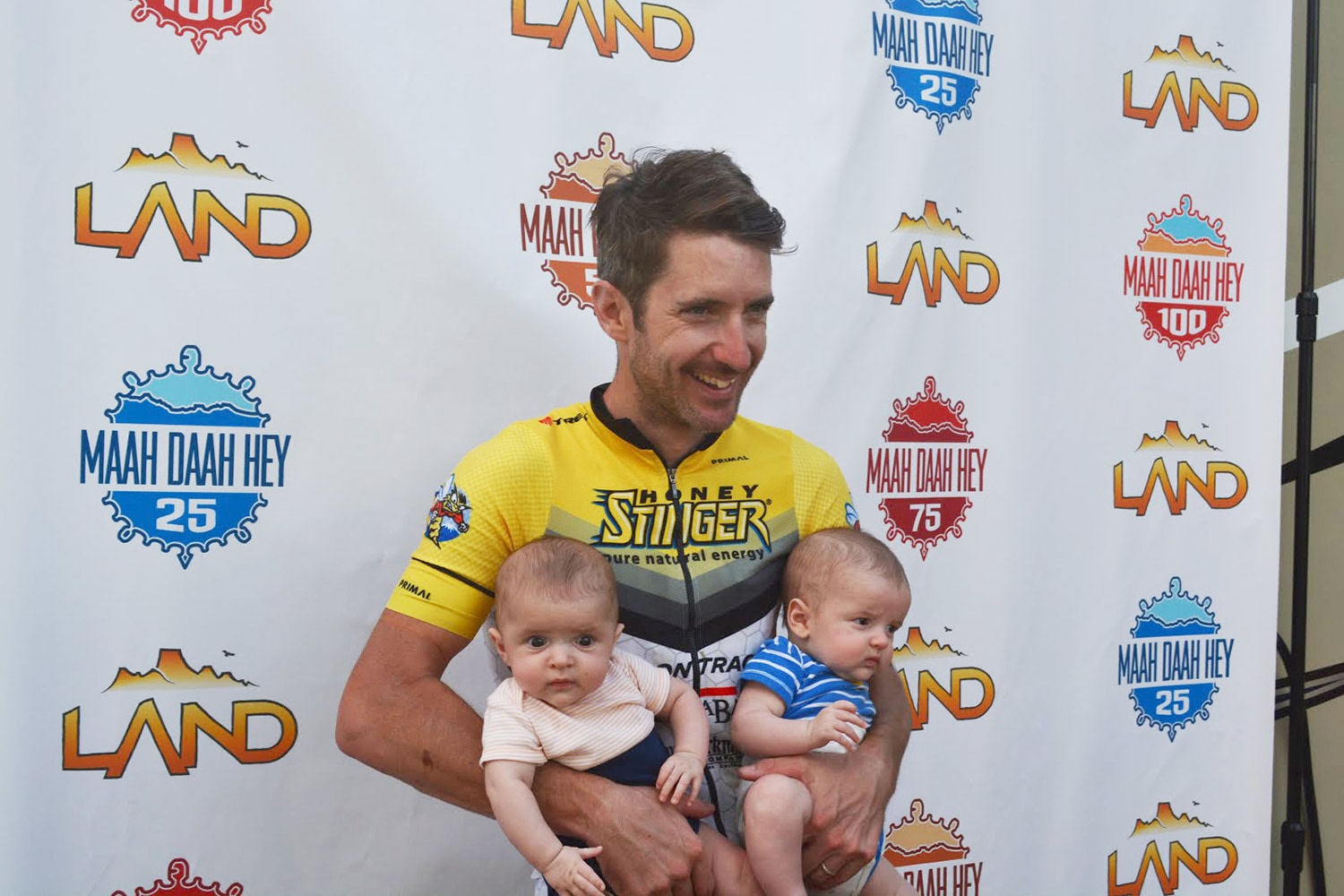Why world-class rider Kelly Magelky skipped this year’s 24-hour Solo Mountain Biking Championships—and how he finds balance on and off the track
It’s midday in September in the Badlands of western North Dakota and the hot desert sun bakes the steep buttes and valleys of gray and red clay. It’s so arid and rocky that few plants grow here.
Standing over his saddle and leaning forward over the handlebars, a lone rider is far ahead of the other racers, powering his way across a shallow creek bed. His lean frame is wrapped in his sponsor’s yellow and black honeycomb colors and his face carries a smile.
“It’s like death by 1,000 cuts.”
The rider is World Championships silver medalist and two-time U.S. Nationals silver medalist Kelly Magelky and the race is the Maah Daah Hey 150 (MDH150). The course, which traverses 151.7 continually undulating and rough miles along North Dakota’s famed long distance trail, features a quad-busting 17,539 feet of elevation gain. It’s one of the toughest races in the country.
“It’s like death by 1,000 cuts,” Magelky, from Dickinson, North Dakota, but residing in Denver, tells REI.
That day in 2016 Magelky set the course record at 17:31. Two years earlier he set the course record for the MDH100, at 8:56, an hour and forty minutes faster than the next finisher.
His records still stand, but Magelky, now a father of twin one-year-old boys and midway through producing a six-part film project presented by the Country Music Hall of Fame and Museum, has his eyes set on a bigger prize: winning the 24-Hour Solo Mountain Biking World Championships, a race where competitors log upwards of 250 rough miles before time runs out.
The most recent World Championships took place on June 2 and 3 in the seaside port of northern Italy’s Finale Ligure, but Magelky wasn’t there because he wasn’t ready. “I’ve come in second before and I know that I’ll have to live in Europe for a month to train,” he says. “I have to take it that seriously.”
Magelky, 37, is confident that by sticking to his balanced training schedule and racing 100+ milers for the next year, he’ll stand on top of the podium in the Scottish Highlands of Fort William in October 2018.

Magelky on his way to 6th at the 2015 24 Hour World Championships. Photo: Nick Howe
But Magelky does more than chase championships. Prior to his professional mountain biking career, in 2003, he teamed up with a small crew and started a film production company called Filament. Magelky writes, directs and produces award-winning films, TV series and documentaries. “I directed a documentary for the band The Fray, which was released with their first album as a companion piece. It’s something I’m still very proud of.”
In 2012, Magelky also wrote and directed Drive, a film series about 10 athletes on their quest to win the Ironman World Championships. When he’s not traveling for work, he’s at his office outside of Denver, surrounded by the steep, technical Rocky Mountains to run and ride. “I’m always running on the trails. It keeps my mind going, too,” he says.
After nearly 10 years of 10- to 12-hour screen binges at the office, Magelky’s sciatic nerve sustained serious damage.
His most recent film project, in collaboration with Crowfly Pictures Entertainment, is the documentary series They Called Us Outlaws. “The films are an exploration of Americana music from the mid-’60s to late ‘70s through the lens of Outlaw Country,” Magelky says.
The films will be released through a mainstream media outlet sometime in the next two years. More than 50 artists were interviewed—including the likes of Willie Nelson, Kris Kristofferson, Waylon Jennings and Jessi Colter—and 300 hours of footage captured.
In 2012, after nearly 10 years of 10- to 12-hour screen binges at the office, Magelky’s sciatic nerve sustained serious damage from too much sitting, causing weakness on one side. The injury forced him to sit out for a season.

Magelky’s off-bike POV | Photo: Kelly Magelky
After the setback, he made a deal with himself that he wouldn’t work in front of his computer for such long periods—yet still be productive—and create more balance in life for himself, his wife Rachel Sturtz, and the boys.
“Racing bikes is temporary. I’m not gonna be this fast forever,” he says. “It will be great to tell my boys what I was able to do.”
Balancing his time with family, producing high-end films, and racing at an elite level isn’t easy but Magelky is making it work. Here are his biggest takeaways that can be applied to anyone—not just professional athletes—seeking balance in their own life.
Optimize Your Work Schedule
To keep from overdoing it at the office, Magelky has organized his work schedule so he’ll only have to log four to five hours in front of a computer a day. “I have owned my own business for almost 15 years, but it took me the majority of those years to learn how to be more efficient,” he says. Not procrastinating is a feat easier said than done, so Magelky had to develop some tricks. “I focus on smaller chunks of time, rather than hours. If you give yourself hourly limits, then it’s easy to waste 15-30 minutes because you think you can accomplish your hour long task in 30 minutes, which usually isn’t realistic.” Additionally, Magelky strictly abstains from social media during work hours and only checks his email at specific intervals throughout the day.
“Another big factor was letting go of some of my perfectionist issues,” he says. “Asking for help, getting someone else’s eyes on a project, and stepping away for a small bit of time really aided in being able to say, ‘enough is enough.'”
Additional changes include setting up a standing desk and training area in his office. Between regular training and getting up away from the keyboard when possible, his lower back has healed. “The reality is there are deadlines and there are long days. So when I do have to be at a computer for a long time, that’s where the stand-up desk comes in. I take breaks, stretch, and ride my bike over to the coffee shop with my boys in the trailer.
That’s the breath of fresh air that I need to be productive.”
Prepare Mentally
Work-related stress was Magelky’s reason for bowing out of this year’s championships. “I would have still been able to go, but I realized it would put a lot of pressure on Rachel and myself. I had too many distractions and going would have been a disappointment as I would have been leaving Rachel with the kids for a week for results that were sub par.”
He knows being physically and mentally prepared for races is critical. “Your body is telling you, ‘You could die.’ That power trumps almost anything. Going through pain and [overriding] your body’s natural responses is what separates people who are going to win from those who aren’t,” Magelky says.
“Anytime I feel crappy on a training ride I know I’ll feel 10 times worse during a race—to know that is coming is a big tool.”
During the race, Magelky knows it’s important to not feel too high or too low. “Don’t romanticize it—this will be really, really hard. Weeks before the race [or major event], ask yourself if you are prepared to do this. Be realistic.”
Share & Work as a Team
Mitigating the stress of a seemingly endless (and potentially dangerous) 24-hour race requires building and supporting your team, “whether it’s your wife or kids or the mechanic at the local bike shop,” Magelky says. “You need to make sure your crew is taken care of because they’re taking care of you.”
During race time, Magelky relies on his pit crew to make sure he’s eating and drinking enough and to check on his mental condition so he doesn’t have to focus on those critical decisions while racing.
At home, he knows his wife doesn’t want to hear about all his training rides while she’s penning stories for Outside and Men’s Fitness, but he knows she’s there for the big ones. At the same time, he says, “her being a journalist is more interesting than anything I’ve ever done. There have been a few times when she’s been knee-deep in a big story and she’ll need to tell me about it. And I tell her about a race and the Outlaw films.
Before every ride, she tells me to make good decisions and to come back in one piece.”
Learn to Accept Failure
“I think the fact I’ve been doing this for so long really helps in the situations like pulling the plug on Italy,” he says. “Maybe the old me would be upset about it and dwell on it for a month or lay blame somewhere else.”
These days, after 10 years of racing, when there are setbacks like missing a World Championship race, Magelky looks into himself for accountability and identifies the lesson.
He admits it still stings to have canceled. However, he had to put his family and work first.
“Most of the time, you can see exactly where things went off the rails and, a lot of times, it’s your own doing,” he says. When this happens he slows down, takes a breath and tells himself, “OK, don’t let this happen again.”
“I know I can elevate to the level I need to be competitive for the next couple years, but time goes fast and I’d like to make sure I’m taking advantage of the opportunities I have in front of me now.”
Lead photo courtesy of Pat Stockert
